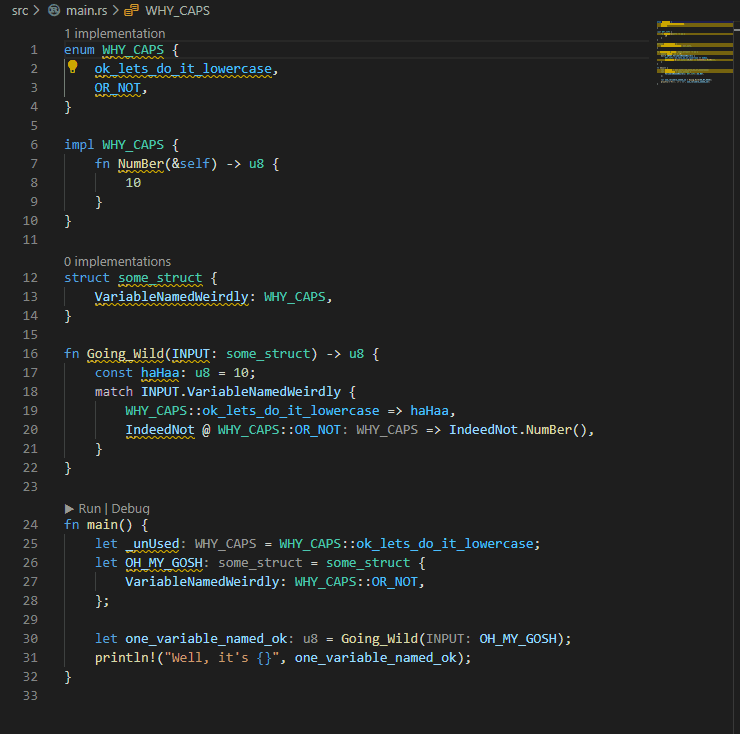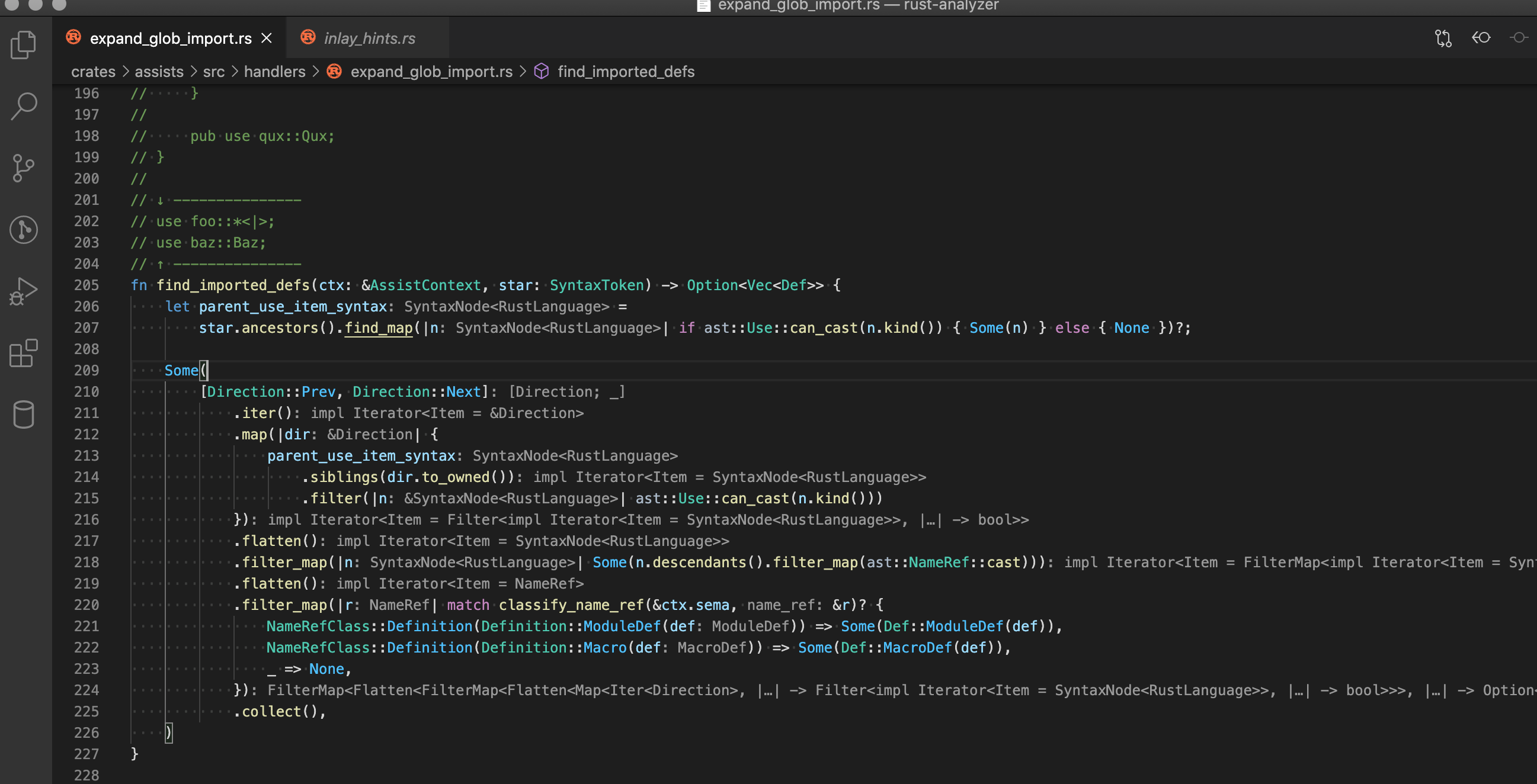| Commit message (Collapse) | Author | Age | Files | Lines |
|---|
| ... | |
| | | |
|
| | | |
|
| |/ |
|
| | |
|
| | |
|
| | |
|
| | |
|
| | |
|
| |\
| |
| |
| |
| |
| |
| |
| |
| | |
6242: Diagnost shorthand in patterns r=matklad a=matklad
bors r+
🤖
Co-authored-by: Aleksey Kladov <[email protected]>
|
| | | |
|
| | | |
|
| | | |
|
| | | |
|
| |\ \
| |/
|/|
| |
| |
| |
| |
| |
| |
| |
| | |
6234: Fix hover over field pattern shorthand r=matklad a=Vlad-Shcherbina
Instead of the information about the field, it now shows the information
about the local.
Fixes #6146
Co-authored-by: Vlad Shcherbina <[email protected]>
|
| | |
| |
| |
| |
| |
| |
| | |
Instead of the information about the field, it now shows the information
about the local.
Fixes #6146
|
| |\ \
| |/
|/|
| |
| |
| |
| |
| | |
6231: Factor macro_rules and format-string highlighting out into submodules r=Veykril a=Veykril
This moves `format`-like macro string highlighting and macro_rules highlight skipping out of the main module.
Co-authored-by: Lukas Wirth <[email protected]>
|
| | | |
|
| | | |
|
| | | |
|
| | | |
|
| |/ |
|
| |\ \
| | |
| | |
| | |
| | |
| | |
| | |
| | |
| | |
| | |
| | |
| | |
| | |
| | |
| | |
| | |
| | |
| | |
| | |
| | |
| | |
| | |
| | |
| | |
| | |
| | |
| | |
| | |
| | |
| | |
| | |
| | |
| | |
| | |
| | |
| | |
| | |
| | |
| | |
| | |
| | |
| | |
| | |
| | | |
6130: Items case quick fix (snake_case / UPPER_SNAKE_CASE / CamelCase) r=matklad a=popzxc
Resolves #4598.
After a third try, it finally works. Boy, it appeared tougher than it seemed.
Initially I thought like "Ha, `rustc` already tells us where idents are named incorrectly. It shouldn't be that hard, should it?".
Well, the problems with the information provided by `rustc` appeared shortly:
- `rustc` warnings are `flycheck` warnings, which are slightly aside from our diagnostics with fixes.
When we map flycheck diagnostic to LSP, we can convert it into a fix, but only if it's marked as `Applicability::MachineApplicable`.
Name case fix is marked `Applicability::MaybeIncorrect`, and for a reason: it only suggest to rename symbol under cursor, without tracking any references.
- Warning spawned by `rustc` are identified by string labels rather than enum. It means that if one day the diagnostic will be renamed in `rustc`, `rust-analyzer` code will still compile, but won't find the required diagnostic by name anymore. If by chance this will happen when some unlucky guy will decide to create their first pull request, they'll be confused by suddenly failing tests (likely) not related to their changes.
- Even if we'll try to build fixes atop of `rustc` warnings, we'll have to do it in the `rust_analyzer::diagnostics::to_proto` module, which is far less
convenient for that matter than `ide` crate.
That's why I decided that it's worth a separate `rust-analyzer` diagnostic, which will implement `DiagnosticWithFix` trait.
After that, I discovered that currently `hir_ty::diagnostics` only check `DefWithBody` types, like function bodies. I had to add support for diagnostics
which look at any `ModuleDef`.
And of course, since I'd added a lot of new functionality, it required extensive testing.
That explains why the diff is so big for a (looking) relatively small feature.
I hope that this PR doesn't only add a small feature, but also creates a base for building another features.
## Example:

P.S. My eyes were bleeding when I had to write the code for the example...
6135: when generating new function, focus on return type instead of body r=matklad a=bnjjj
I made a little change when we use the assist to generate a new function, instead of focusing on the function body, it will focus on return type
Co-authored-by: Igor Aleksanov <[email protected]>
Co-authored-by: Benjamin Coenen <[email protected]>
|
| | | | |
|
| | | | |
|
| | | | |
|
| | | | |
|
| | | | |
|
| | | | |
|
| | | | |
|
| |\ \ \
| | | |
| | | |
| | | |
| | | |
| | | |
| | | |
| | | | |
6205: Fix iterator hint shortening heuristic r=SomeoneToIgnore a=Veykril
Turns out I made a mistake with the heuristic check which is always true, so all iterators exposed from `core` were shortened, including things like ranges. 😅
Co-authored-by: Lukas Wirth <[email protected]>
|
| | | | | |
|
| |\ \ \ \
| |/ / /
|/| | |
| | | |
| | | |
| | | |
| | | |
| | | |
| | | |
| | | |
| | | |
| | | |
| | | |
| | | | |
6153: Improve prime_caches and display its progress r=matklad a=jonas-schievink
It now computes the `CrateDefMap` of all crates, which is generally a reasonable approximation for "IDE features ready". There is still some delay after this finishes, I suspect mostly due to impl collection, which takes a while, but this should be an improvement already.
For more accurate progress reports, this topologically sorts all crates before starting this operation. ~~Because that is also the ordering in which parallelization makes sense (which was previously attempted in https://github.com/rust-analyzer/rust-analyzer/pull/3529), I decided to throw that into the mix as well. It still doesn't provide *that* much of a performance boost, but it does scale beyond the current single-core architecture, and adding it was very easy.~~
~~Unfortunately, as written, this will not tell the user which crate is actually causing slowdowns, since the displayed crate is the last one that was *started*, not the one we are currently *blocked* on, but that seems fairly difficult to implement unless I'm missing something.~~
(I have removed rayon for now since it does not work correctly with cancellation.)
Co-authored-by: Jonas Schievink <[email protected]>
|
| | |/ / |
|
| |\ \ \
| | | |
| | | |
| | | |
| | | |
| | | |
| | | |
| | | |
| | | |
| | | |
| | | |
| | | |
| | | |
| | | |
| | | | |
6195: Shorten iterators in associated params r=matklad a=SomeoneToIgnore
Applies the same iterator-shortening logic to the iterator associated types, recursively.
Before:

After:
<img width="1192" alt="image" src="https://user-images.githubusercontent.com/2690773/95662894-e9038080-0b42-11eb-897d-527571ccac58.png">
Co-authored-by: Kirill Bulatov <[email protected]>
|
| | | | | |
|
| | | | | |
|
| |\ \ \ \
| | | | |
| | | | |
| | | | |
| | | | |
| | | | |
| | | | |
| | | | |
| | | | |
| | | | | |
6198: Skip macro matcher fragment name semantic highlighting r=matklad a=Veykril
Implements a small state-machine for macro_rules! highlighting to separate out the matcher part of its rules. This skips semantically highlighting names of metavariables in the matcher and expander. This might even allow for more fun macro highlighting things in the future.
Fixes #4380.
Co-authored-by: Lukas Wirth <[email protected]>
|
| | | | | | |
|
| |\ \ \ \ \
| |_|_|/ /
|/| | | |
| | | | |
| | | | |
| | | | |
| | | | |
| | | | |
| | | | |
| | | | | |
6199: Fix `mut self` not emitting mutable binding on `self` use r=matklad a=Veykril
Prior to this, when `self` in a function is taken by value and bound mutably, its use inside of the method body won't be marked `mutably`.
Fixes #5461
Co-authored-by: Lukas Wirth <[email protected]>
|
| | |/ / / |
|
| |\ \ \ \
| |_|/ /
|/| | |
| | | |
| | | |
| | | |
| | | |
| | | |
| | | |
| | | |
| | | |
| | | |
| | | |
| | | |
| | | | |
5917: Add a command to open docs for the symbol under the cursor r=matklad a=zacps
#### Todo
- [ ] Decide if there should be a default keybind or context menu entry
- [x] Figure out how to get the documentation path for methods and other non-top-level defs
- [x] Design the protocol extension. In future we'll probably want parameters for local/remote documentation URLs, so that should maybe be done in this PR?
- [x] Code organisation
- [x] Tests
Co-authored-by: Zac Pullar-Strecker <[email protected]>
|
| | | | | |
|
| | | | | |
|
| | | | | |
|
| | | | | |
|
| | | | | |
|
| | | | | |
|
| | | | | |
|
| | | | |
| | | |
| | | |
| | | | |
IMO this is too much work to be worth fixing at the moment.
|
| | | | |
| | | |
| | | |
| | | |
| | | |
| | | |
| | | |
| | | |
| | | | |
Currently a method only has defaultness if it is a provided trait
method, but this will change when specialisation is available and may
need to become a concept known to hir.
I opted to go for a 'fewest changes' approach given specialisation is
still under development.
|
